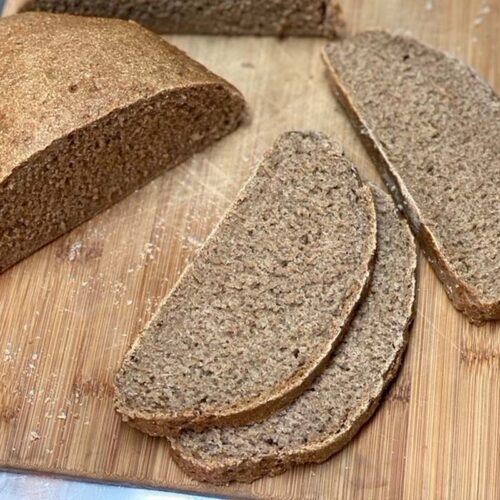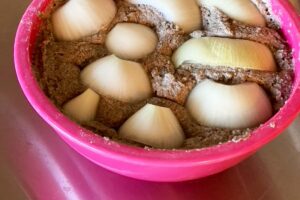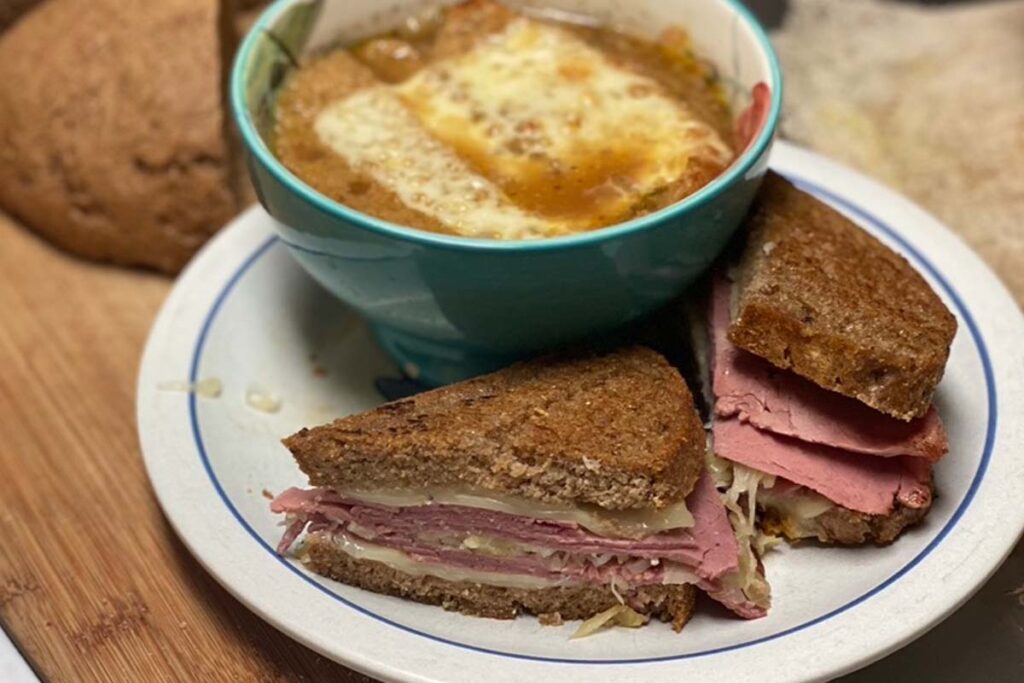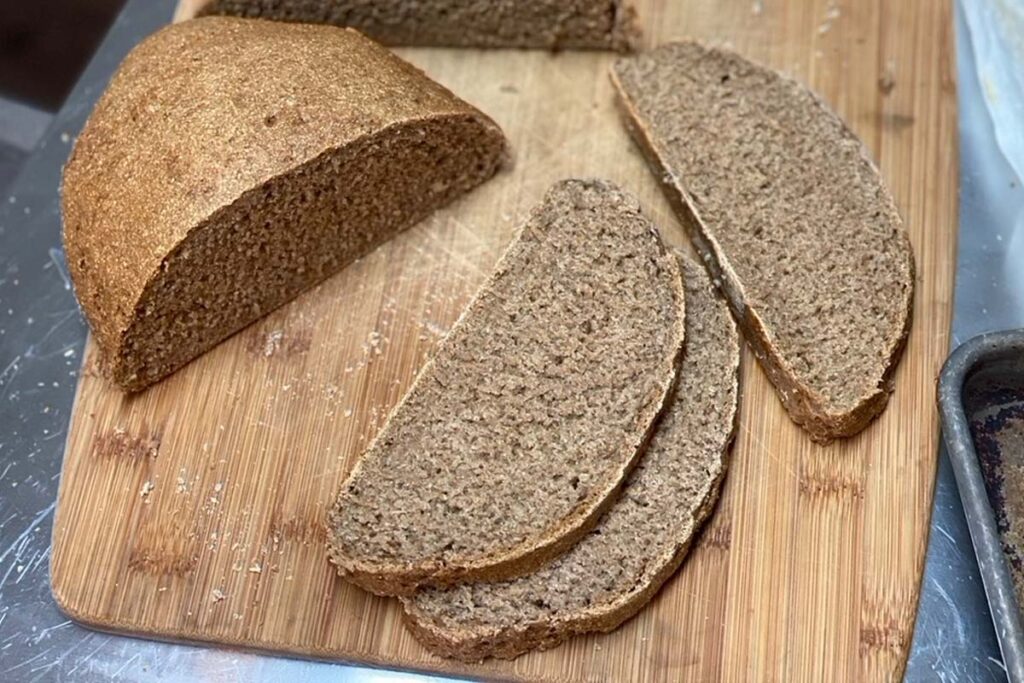I was first introduced to Rye bread through a Ruben sandwich, which my mom always ordered when we’d go to sandwich shops. Over the years I’ve learned to not limit Rye to just a Ruben, as it’s flavor can be appreciated as a stand-alone bread with butter or combined with different meats and cheese as part of a charcuterie board.
I call this “almost” sourdough because although it uses a Rye sourdough starter to get the flavor of a Rye bread, it relies on commercial dry yeast to give it the rise it needs and to cut down on the fermentation time. It’s also a good basic recipe that you can modify to your own preferences.
If you’re new to Rye or looking for a fail-proof, go-to recipe, this is it.
Ingredients for whole grain rye sourdough
The wonderful part of any wild yeast (sourdough) bread is the simplicity of its ingredients.
- Commercial active dry yeast: I use this in conjunction with my rye sourdough starter to get lift
- Sourdough starter: It’s best if your sourdough has been converted to Rye (which you can do by feeding daily for about five days) but any active, healthy sourdough starter will work
- Rye flour: I grind my own to ensure it’s 100% whole grain, but store-bought rye flour will work as well; you will need less water if you’re using store-bought rye (read more about rye’s short shelf life here)
- Whole wheat flour: I use hard red wheat berries that I grind in my mill, but any whole grain flour will work
- White or yellow onion: We won’t cut cup the onion to put into the bread, but instead use it to give your soaker flavor
- Caraway seeds: You can omit if you don’t like the flavor, but caraway seeds give this bread a distinct flavor that is long-associated with Rye bread
- Salt: I use Celtic sea salt or Kosher salt
How to enjoy rye sourdough
Besides the obvious way, with salted butter on top (SO good), Rye sourdough bread has so many options. It’s versatile and hearty, but also light-enough to be an all-purpose bread because we’re combining Rye with Wheat.
- Sandwich bread: Pair with your favorite fillings such as ham/cheese/lettuce/tomato/mustard or a classic Ruben with sauerkraut/Swiss cheese/thousand island dressing/corned beef
- Soup: Pair your rye sourdough with a rustic soup or hearty stew – the bread’s robust flavor and chewy texture make it an ideal companion for dipping
- Charcuterie: You can also slice it thin and serve with an assortment of cheeses and cured meats for a charcuterie board
- Breakfast: If you’re a fan of traditional morning spreads, rye bread toast topped with avocado and eggs (I like mine over medium!) or a generous helping of homemade jam
- Strong flavors: Skip more delicate dips like olive oil and no matter what you do with your rye, make sure you pair it with a stronger flavor like mustard
Frequently asked questions
Can I use 100% Rye flour instead of a combination of Rye and Wheat?
Yes, but the loaf will be more dense and not have as much of a rise. Wheat is what helps this recipe feel and taste lighter.
Can I omit the commercial yeast?
You can choose not to use the commercial yeast but it does help the bread rise and not be quite as dense. Double your rise times to 3-hours, paying careful attention to not let it over ripen.
Can I skip the onion or caraway seeds?
Absolutely. I always recommend trying a recipe exactly as-is first and seeing if you don’t like the onion or caraway taste. Keep in mind, the onions are NOT cut up and put into the dough. We use use them in the soaker and then you remove them the next morning so this bread does not have a onion taste to it.

Rye and wheat (almost) sourdough
Equipment
- 3 bowls (various sizes)
- 1 Stand mixer (or hand mix using a dough hook, fork, or just your hands)
- 1 serrated knife or lame
- 2 bannetons or bowls with floured towels (or a greased baking sheet can work as well)
Ingredients
Starter (night before)
- 1/2 white or yellow onion (cut into slices)
- 3/4 cup Rye sourdough starter (wheat sourdough starter will work as well)
- 3/4 cup warm water (175 ml)
- 2 cups Rye flour (255g) (fresh milled, but if using store-bought, you won't need as much water)
Dough (day of)
- 4 tsp active dry yeast (1/2 oz or 14 g) (or one packet)
- 2/3 cup warm water (160 ml)
- 3.5 cups whole wheat flour (525 g)
- All starter mixture (with onions removed)
- 2.5 tsp salt
- 1 tbsp caraway seeds
- 1/3 cup extra water (this is your working water which you may or may not need to use all of; you may need more)
Instructions
Starter (night before)
- The night before your baking day, mix your sourdough starter, water, and Rye flour in a bowl until it's combined. I do this by hand or using a dough whisk.
- Spread the sliced onion over the top of the mixture, pushing it down lightly into the dough. Cover tightly and leave 12 to 15 hours or more at room temperature.

Dough (day of)
- Remove the onions from the starter mixture and discard them.
- Using a small bowl, dissolve the yeast in the 2/3 cup (160 ml) of warm water.
- In your mixing bowl, stir your dry ingredients together first (whole wheat flour, salt, and seeds). Then add the starter from the night before and the yeast/water mixture. Using a dough hook attachment, knead for 5-7 minutes for about 15 minutes if kneading by hand. (Wet your hands with the remaining 1/3 cup if you're kneading by hand or add in using 1 tablespoon increments until the dough becomes soft and slightly sticky.)
- Transfer dough to a clean bowl and cover with a towel. Let it rise in a warm spot for about 1.5 hours.
- Turn the dough on a floured surface, separate it into two rounds and let it rest for another 15-minutes with the towel covering the dough so it doesn't dry out.
- Put rounds into floured banneton, bowls with floured towels, or onto a greased baking sheet that has been dusted with cornmeal or flour. Let rise again in a warm place, for another 1-1.5 hours, until the dough slowly returns a gently made fingerprint.
- Using a serrated knife or lame, slash the loaves and place them in a preheated oven (450°F). I use a dutch oven and bake mine one at a time. Bake for 10 minutes with the lid on, reduce the heat and take the lid off, and finish baking at 325°F for 40 to 50 minutes, or until done.









